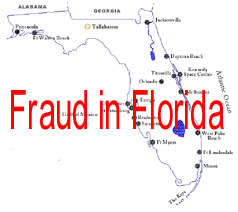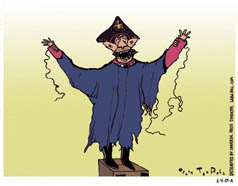Reagan, Goldwater And History
A wingnut friend has taken exception to my citing of Reagan's opposition to landmark Great Society legislation as an example of how Ronnie was on the wrong side of history.
Goldstein's supersciliousness on this subject is not unexpected. He still doesn't get it. Any lawyer or any citizen who cares one whit about the Constitution should praise Reagan and Goldwater for their principled stands on the Civil Rights act of 1964, the Voting Rights act of 1965 and Medicare, as all three were completely unconstitutional because they simply trashed the 10th amendment.Although I do not subscribe to any doctrine of Supreme Court infallibility, I do generally believe that any credible legal argument will find at least a measure of support somewhere on the Supreme Court. However, tenth amendment challenges to the Civil Rights Act of 1964 did not.
The Civil Rights Act of 1964 was immediately challenged by the proprietor of the Heart of Atlanta Motel in Atlanta, Georgia. The motel's attorneys challenged the legislation on the basis of, among other things, the tenth amendment of the constitution. They found not a single justice receptive to their argument. The Supreme Court voted 9-0 in favor of the constitutionality of the Civil Rights Act of 1964. The majority opinion was written by Tom Clark of Texas. Hugo Black of Alabama wrote a special concurrence.
As for the argument that Reagan and Goldwater should be lauded for their "principled" opposition to the Civil Rights Act of 1964, I can only laugh. Goldwater's grandstanding was a shameless and politically expedient appeal to bigotry that was so thoroughly rejected by even his own party that such race baiting tactics were deemed unfitting of national political discourse until Reagan led a recrudescence of this ploy in the 1980's. If Goldwater had been so concerned about the tenth amendment, why did he support the Civil Rights Act of 1957 as proposed by Eisenhower, a bill that proposed granting the federal government the authority to enforce voting rights, to seek injunctions against all civil rights violations, and to prosecute violators of these injunctions? The civil rights bill of 1957 was no less an incursion on states rights than the Civil Rights Act of 1964, but somehow Barry wasn't as concerned in 1957. No, Barry's newfound consitutional beliefs in 1964 reflected his desire to capture the south in the '64 presidential election. John F. Kennedy knowingly and courageously put the south back in play in presidential politics for the first time in a century when he decided to cast the civil rights issue as a moral issue. Barry sunk to the occasion, suddenly discovered the tenth amendment, took his 40-some electoral votes from the Land of Dixie, and earned himself a place in the Political Expediency Hall of Fame.
I don't like to trash Barry, because he softened considerably in his old age. But Barry's trolling for southern votes in '64 was distinctly unprincipled, and Reagan's support of such racial pandering singularly unseemly.




0 Comments:
Post a Comment
<< Home